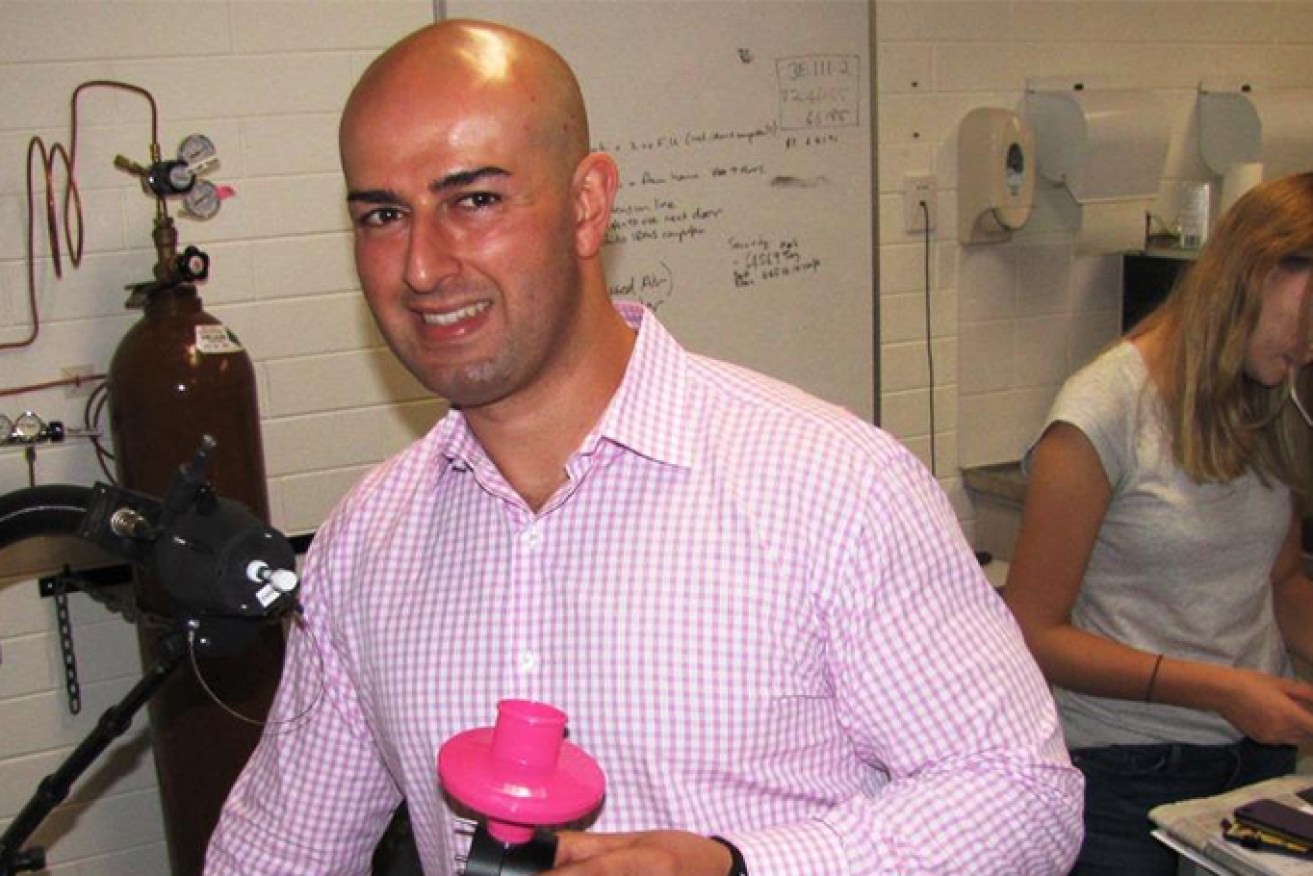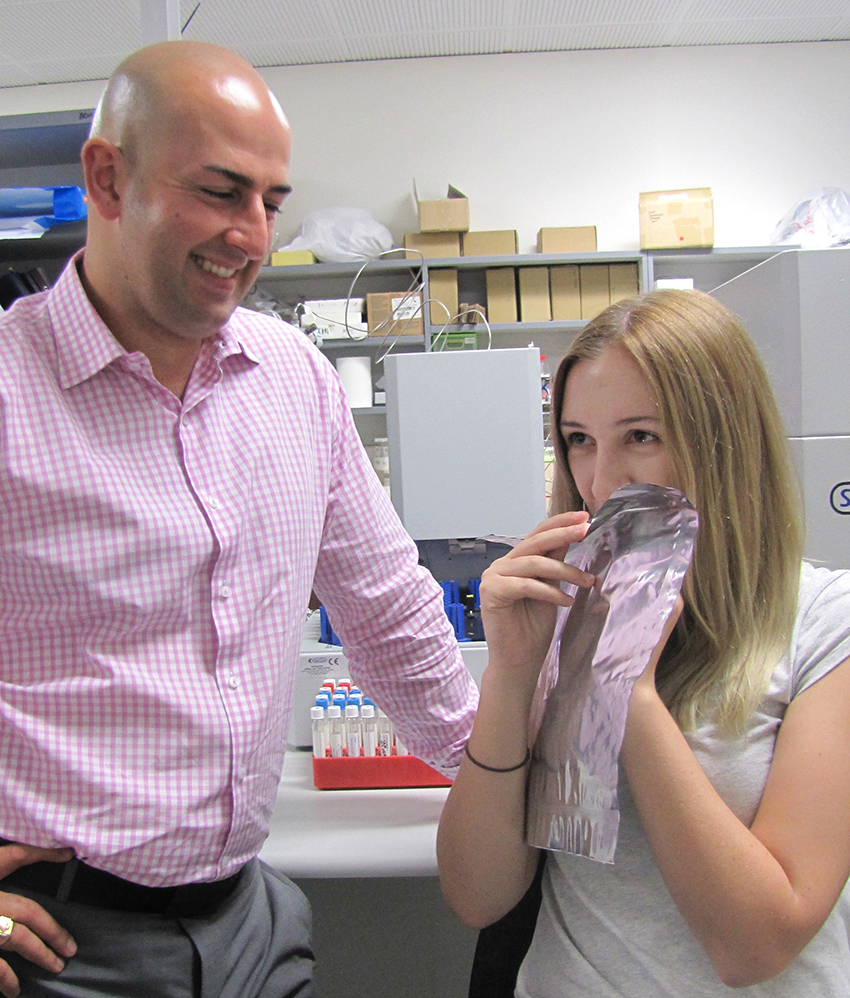
Breath testing for cancer shows life-saving potential
Early detection and management of life-threatening cancers could be as easy as giving a breath test, thanks to pioneering South Australian research led by Flinders University.

Dr Roger Yazbeck and PhD candidate Simone Jaenisch in the Flinders Breath Analysis Research Laboratory at Flinders Medical Centre.
With the global cancer burden set to double by 2030, the Flinders School of Medicine Breath Analysis Research Laboratory is laying the groundwork to launch revolutionary new ‘blow in the bag’ technology for early, non-invasive, cost effective detection and ongoing monitoring of numerous cancers and disease.
First off the block is breath tests for gastrointestinal conditions such as stomach, oesophageal and head and neck cancer, which has a five-year survival rate of approximately 25% (gastric) and 17% respectively.
Treated in its early stages, there is a much better five-year survival rate – up to 90%.
Flinders breath researcher Dr Roger Yazbeck says the symptoms of oesophageal cancer manifest late, often when the tumour is already invasive and has metastasised, resulting in late diagnosis and poor prognosis.
“We are building a unique breath-analysis research facility here in Australia that is investigating how breath analysis can change existing methods of diagnosis and management,” says Dr Yazbeck, who holds a Catherine Marie Enright Kelly Cancer Research Fellowship at Flinders University.
“With more than 2000 compounds in a single human breath, there is plenty of information there about the state of our health.
“Already we have started collecting breath samples from a range of patients to identify a range of biomarkers for cancer.
“Once we have this data, we will conduct validation trials to roll out some of the first tests, perhaps in less than five years.”

A proof-of-concept paper, entitled ‘In vitro development and validation of a non-invasive 13C-stable isotope assay for ornithine decarboxylase (ODC)’, just published in the international Journal of Breath Research, describes how ODC in human breath can be used as a potential prognostic marker for oesophageal cancer.
It is one of the active breath tests under investigation, along side passive breath testing that will measure a whole range of different compounds which represent information about a person’s health.
Dr Yazbeck stresses that the new technique would not replace existing tests, but would be used to supplement existing diagnostics and treatments.
“A rapid, simple and non-invasive tool would help to guide better clinical management, avoiding repeated and costly invasive tissue testing which also significantly impacts patients’ quality of life,” Dr Yazbeck says.
“The breath tests have broad translational application, and have been shown to correlate to more costly, cumbersome and invasive ‘gold-standard’ techniques, including endoscopies in oesophageal cancer patients.
“The non-invasive detection of altered proliferative activity within the oesophagus that could lead to more rapid identification of pre-cancerous and cancerous lesions.”
With about 1000 cases in Australia diagnosed every year, the incidence of oesophageal cancer has risen six-fold in the past 40 years, largely due to gastro-oesophageal reflux interacting with obesity.
Based at Flinders Medical Centre, the Breath Analysis Research Laboratory is supported by Flinders University, the Flinders Centre for Innovation in Cancer (FCIC) and several other Australian and overseas universities and medical specialists.
The facility can do passive breath tests that measure the compounds in the breath, and also active breath tests that measure carbon dioxide levels expelled after the patient swallows a liquid that interacts with cancer cells.
In parallel, other Flinders specialists are focusing on improving blood testing for difficult-to-diagnose gastric, oesophageal, neck and throat and other cancers.
The Flinders research team also is collaborating with University of Adelaide and Women’s and Children’s Hospital to develop novel breath analysis tools to manage other serious conditions, including cystic fibrosis, neuro-degenerative diseases and general gut disorders.
Simone Jaenisch, Michelle Squire, Ross Butler and Roger Yazbeck, In vitro development and validation of a non-invasive 13C-stable isotope assay for ornithine decarboxylase, at http://iopscience.iop.org/article/10.1088/1752-7155/10/2/026009/pdf




